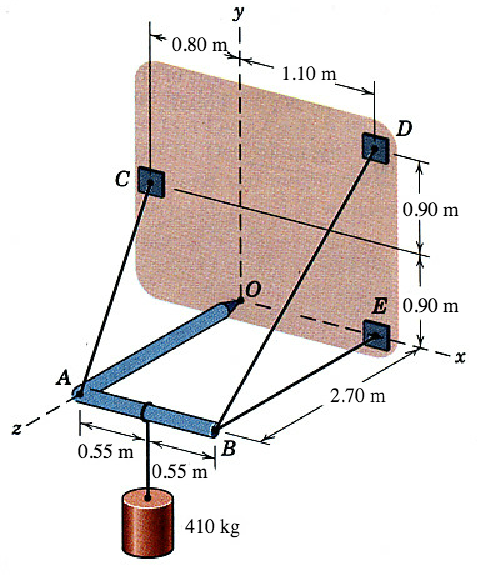This document uses the open source Jupyter Notebook and the Python programming language to demonstrate a finite difference numerical method for solving a differential equation.
%matplotlib inline
# Required libraries
import numpy as np
import matplotlib.pyplot as plt
import seaborn as sns
# Seaborn aesthetics
sns.set_context("paper", font_scale=1.8,
rc={"lines.linewidth": 3, "figure.figsize": (10,6)})
sns.set_style("ticks")
Beam Deflection Problem
 Figure 1. Uniformly-loaded beam (Chapra, p. 639).
Figure 1. Uniformly-loaded beam (Chapra, p. 639).
The basic differential equation of the elastic curve for a simply supported, uniformly loaded beam (Fig. 1) is given as
where $E=$ the modulus of elasticity, and $I=$ the moment of inertia. The boundary conditions are $y(0)=y(L)=0$. Solve for the deflection of the beam using the finite-difference approach $(\Delta x = 0.6 m)$. The following parameter values apply: $E = 200$ GPa, $I = 30,000$ cm$^4$, $w = 15$ kN/m, and $L = 3$ m. Compare your numerical results to the analytical solution:
Analytical Solution
def y(x):
"""
Vertical deflection, y, of the beam in 10E-5 m.
"""
E = 200 _ 10**9 # Pa
I = 30000 / 100**4 # m^4
w = 15 _ 1000 # N/m
L = 3 # m
return ((w*L*x**3)/(12*E*I) - (w\*x**4)/(24*E*I) - \
(w*x*L**3)/(24*E*I)) \* 10**5
Central Difference Method
def cdiff_beam(L,ya,yb,n):
"""
Approximate vertical deflection, y, of the beam in 10E-5 m,
using central difference method.
Args:
L = length of the beam, m
ya = vertical deflection at x = 0
yb = vertical deflection at x = L
n = desired number of interior segments
"""
E = 200 _ 10**9 # Pa
I = 30000 / 100**4 # m^4
w = 15 _ 1000 # N/m
i = 0
x = 0
dx = L/n
X = [x]
A = np.zeros(shape=(n+1,n+1))
b = np.zeros(shape=(n+1,1))
while i < n-1:
i = i + 1
x = x + dx
b[i] = dx**2 * (1/(2*E*I)) * (w*L*x - w\*x**2)
A[i][i] = -2
if i < n:
A[i][i+1] = 1
A[i][i-1] = 1
X = np.append(X, x)
A[0][0] = 1
A[n][n] = 1
b[0] = ya
b[n] = yb
X = np.append(X, x+dx)
Y = np.linalg.solve(A,b)
# print(A); print(b)
return X, Y
Plot of Solutions
x = np.linspace(0,3)
X,Y = cdiff_beam(3,0,0,8)
plt.plot(x,y(x), lw=7, alpha=0.6, label="Analytical Solution")
plt.plot(X,Y*10**5, "o-", lw=2, ms=8, color="#c44e52", label="Finite Difference Method")
plt.legend(bbox_to_anchor=[0.665, 0.81])
plt.xlabel("distance, $x$ (m)")
plt.ylabel("deflection, $y$ (10$^{-5}$ m)")
sns.despine()
plt.show()
 Loaded Beam
Loaded Beam
 Brian D. Wendt
Brian D. Wendt

